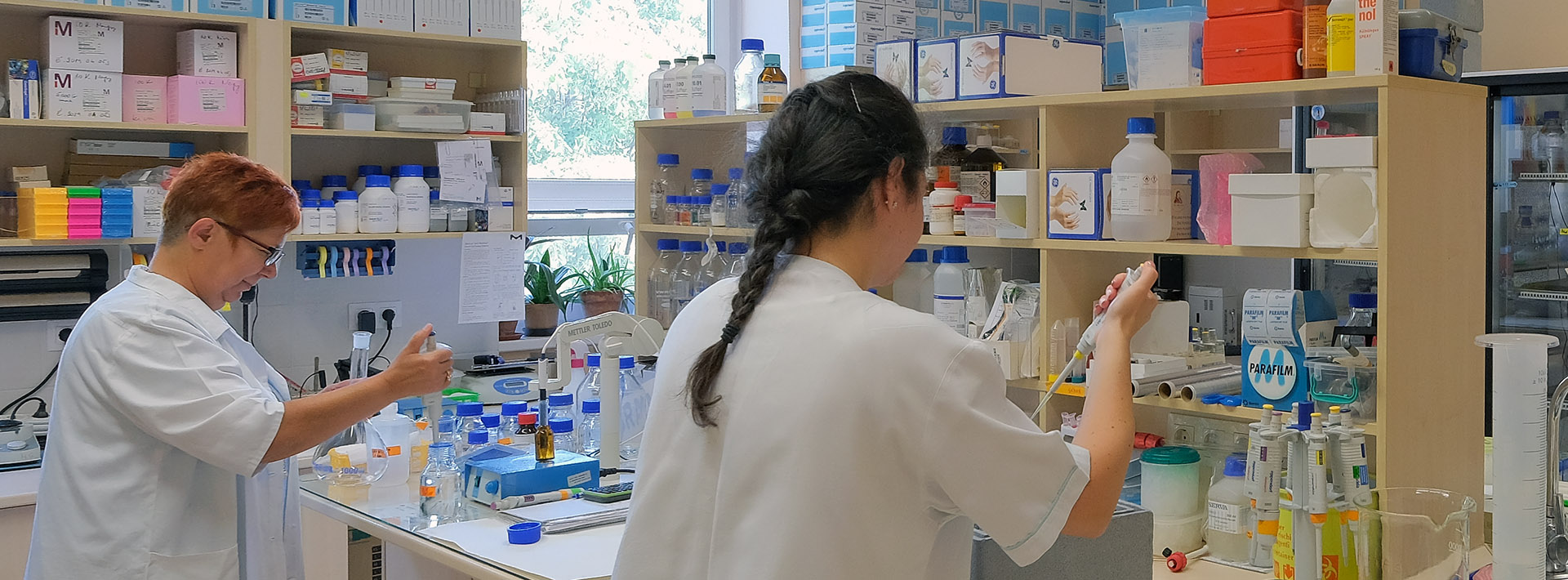Daten
Offizielle Daten in der Fachveröffentlichung für das folgende akademische Jahr: 2024-2025
Lehrbeauftragte/r
-
Bódis Emőke
assistant professor,
Department of Biophysics -
Semesterwochenstunden
Vorlesungen: 28
Praktika: 0
Seminare: 0
Insgesamt: 28
Fachangaben
- Kode des Kurses: OPA-B2E-T
- 2 kredit
- Pharmacy
- Basic modul
- spring
OPA-B1E-T finished , OPA-B2G-T parallel
Zahl der Kursteilnehmer für den Kurs:
min. 5 – max. 100
Thematik
Basic terms and concepts of statistics and their use in solving physical, chemical and biological problems. handling and computer use. The main topics included: descriptive and inferential statistics, exploring data by graphical and numerical means, basic methods for statistical inference.
Vorlesungen
- 1.
An introduction: statistics and the biological sciences. The applied models. Planning and carrying out an experiment. Data analysis, frequency distributions and histogram.
- Bódis Emőke - 2.
An introduction: statistics and the biological sciences. The applied models. Planning and carrying out an experiment. Data analysis, frequency distributions and histogram.
- Bódis Emőke - 3.
The characteristics of population and sample: mean, dispersion and standard error. The elements of standard error calculation. Probability and probability distribution.
- Bódis Emőke - 4.
The characteristics of population and sample: mean, dispersion and standard error. The elements of standard error calculation. Probability and probability distribution.
- Bódis Emőke - 5.
Continuous probability distributions. Normal and lognormal distribution
- Trombitás Norbert - 6.
Continuous probability distributions. Normal and lognormal distributiontromb
- Trombitás Norbert - 7.
STATISTICAL HYPOTHESIS TESTING: Hypothesis testing: the sign test
- Karádi Kristóf Kálmán - 8.
STATISTICAL HYPOTHESIS TESTING: Hypothesis testing: the sign test
- Karádi Kristóf Kálmán - 9.
Hypothesis testing: the u-test
- Karádi Kristóf Kálmán - 10.
Hypothesis testing: the u-test
- Karádi Kristóf Kálmán - 11.
Analysis of the means with t-test
- Karádi Kristóf Kálmán - 12.
Analysis of the means with t-test
- Karádi Kristóf Kálmán - 13. T test - Karádi Kristóf Kálmán
- 14. T test - Karádi Kristóf Kálmán
- 15.
Nonparametric methods: Wilcoxon test, Mann-Whitney U test
- Bukovics Péter - 16.
Nonparametric methods: Wilcoxon test, Mann-Whitney U test
- Bukovics Péter - 17.
The chi-square test and its applications: goodness of fit test and test for independence
- Bukovics Péter - 18.
The chi-square test and its applications: goodness of fit test and test for independence
- Bukovics Péter - 19.
Analysis of variance
- Bukovics Péter - 20.
Analysis of variance
- Bukovics Péter - 21.
Regression analysis. Least squares principle
- Csepregi Kristóf - 22.
Regression analysis. Least squares principle
- Csepregi Kristóf - 23.
Correlation analysis. Rank correlation
- Csepregi Kristóf - 24.
Correlation analysis. Rank correlation
- Csepregi Kristóf - 25.
Consultation.
- Bódis Emőke - 26.
Consultation.
- Bódis Emőke - 27.
Test.
- Karádi Kristóf Kálmán - 28.
Test.
- Karádi Kristóf Kálmán
Praktika
Seminare
Materialien zum Aneignen des Lehrstoffes
Obligatorische Literatur
Vom Institut veröffentlichter Lehrstoff
Homepage of the Department of Biophysics:
https://aok.pte.hu/en/egyseg/10/oktatasi-anyagok
Skript
Empfohlene Literatur
Voraussetzung zum Absolvieren des Semesters
nincs
Semesteranforderungen
Two written tests are scheduled during the semester covering the topics/calculations/etc discussed during the lectures. The expected dates: 7th week, 14th week. Based on the average of the two grades obtained for the tests a theory grade is recommended.
Grading policy: < 60% fail (1), 60 – 69% satisfactory (2), 70 – 79% average (3), 80 – 89% good (4), > 90% excellent (5)
To pass, at least 60% has to be reached at each test.
If the recommended theory grade is accepted that will be the final grade.
In other cases, the theory grade may be obtained during the exams announced in the exam period.
Möglichkeiten zur Nachholung der Fehlzeiten
Maximum 3 absences are allowed. The opportunity to make up for absence is not provided.
Prüfungsfragen
The prerequisite for registering for the theory exam (also for the acceptance of the recommended theory grade) is the passing of the practical test and getting practical grade (> 2).
The theory grade is obtained based on the result of the written exam.
Grading policy: < 60% fail (1), 60 – 69% satisfactory (2), 70 – 79% average (3), 80 – 89% good (4), > 90% excellent (5)
Topics of the exam questions:
Descriptive statistics; describing data, generating and evaluating data display
Probability, random variable, probability distributions
Principles of hypothesis testing
Parametric and nonparametric tests
Correlation and regression analysis
Prüfer
- Bódis Emőke
- Bukovics Péter
- Csepregi Kristóf
- Karádi Kristóf Kálmán
- Trombitás Norbert
